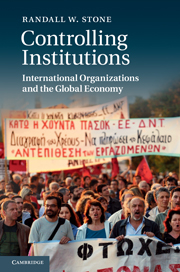Book contents
- Frontmatter
- Contents
- List of figures
- List of tables
- Preface
- List of abbreviations
- 1 Introduction: international organization and US power
- PART ONE THEORY
- 2 A theory of international organization
- 3 A model of informal governance
- PART TWO CASES
- PART THREE HYPOTHESES
- Appendix: additional tables
- References
- Index
2 - A theory of international organization
Published online by Cambridge University Press: 11 April 2011
- Frontmatter
- Contents
- List of figures
- List of tables
- Preface
- List of abbreviations
- 1 Introduction: international organization and US power
- PART ONE THEORY
- 2 A theory of international organization
- 3 A model of informal governance
- PART TWO CASES
- PART THREE HYPOTHESES
- Appendix: additional tables
- References
- Index
Summary
The relationship between power and legitimacy has been a central concern in the study of international politics since the time of Thucydides, which has reflected an appreciation that international order has both normative and material foundations. However, the concepts of power and legitimacy have generally been loosely defined, which has prevented the elaboration of fully-specified theories and slowed the development of cumulative knowledge. The first stage of the argument of this book is to develop precise definitions of legitimacy and power which can be used as the building blocks of a formal model. This chapter presents the general argument: power and legitimacy are related in a particular way, which relies on organizations that combine elements of formal and informal governance. In the following chapter, the argument is rendered in the form of a formal game-theoretic model. The argument applies to international organizations, to political systems, to corporate governance – in short, to all forms of organized political interaction. The conception of power that I offer in terms of outside options, however, is particularly potent in partially institutionalized settings, such as the anarchical international system or incompletely consolidated democracies.
The building blocks of the model of informal governance are: (1) the existence of parallel formal and informal modes of governance; (2) legitimacy defined in terms of voluntary participation; and (3) contingent delegation.
Formal and informal governance
Formal rules facilitate social interactions, whether these interactions occur through markets, within hierarchically organized business firms, in political systems, or in international relations.
- Type
- Chapter
- Information
- Controlling InstitutionsInternational Organizations and the Global Economy, pp. 11 - 32Publisher: Cambridge University PressPrint publication year: 2011



